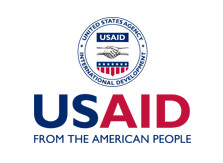|

A pupil tries her hands on a computer keyboard while other watch. |
Success Story
Rural Communities Incite Government To Improve Education
Kano State, Northern Nigeria, January 2008
Curious children at Gaya Special Primary School itched at a turn on one of the new computers in the computer laboratory. For most of them it was the first time ever seeing and touching the 'television-like' machine. Crowded in the laboratory, they listened with rapt attention as their teacher gave instruction on the parts of a computer and how to operate it. Nearby, another crop of students sat comfortably in their new classrooms writing down assignments for the weekend. It was their first ideal school environment. Explaining the excitement of the children, Head teacher Hussaini Iliyasu said, “The classrooms were fast becoming death traps and not conducive for any learning activity.” He continued, “This is the first time the Local Government Area would have a computer laboratory and we are delighted to be the pioneers.”
|
“This is the first time we united under one voice to call the government to action on our priority issues. At first we didn't realize what an effective tool we had as a people, but now we do.” |
Though most of the residents in Gaya, a remote and rural Local Government Area in Kano State, are farmers and traders, several influential Nigerians holding public office call this part of the country home. Nonetheless, the area's public infrastructure and services suffer from gross neglect, thus, public health and education services are rarely used. Years of neglect have led to dilapidated structures while learning aids and instructional materials are almost non-existent, thereby negatively affecting learning outcomes for public school children.
In May 2007, the COMPASS-supported Community Coalitions in the area reinforced their strategies by establishing a Community Coalition Forum representing the interests of all three of the far apart communities in the Local Government Area - Gaya Kudu, Gaya Arewa and Kademi. Explaining this strategy, Gaya Kudu Quality Improvement Team Chairman, Abass Ibrahim, said, “In order to get the level of results we wanted, we had to unify our ideas and voices. With the culture and tradition of our people, if the representatives do not respond appropriately they would have wronged all.” With the formation of the Forum and with guidance from COMPASS, the community members mobilized resources to equip its only hospital with basic infrastructure ranging from benches for the antenatal care section to renovation of toilets and installation of a borehole.
|

A pupil learns basic computer operations. | Not relenting in their efforts, they researched and approached two natives of the Local Government Area who occupied seats at the National and State Houses of Assembly to garner their support for two school projects. Their efforts yielded results. While the National Assembly Representative supplied computers and trained two teachers on computer skills, his state counterpart provided funds for renovating seven school blocks in the three communities. According to Abass, “This is the first time we united under one voice to call the government to action on our priority issues. At first we didn't realize what an effective tool we had as a people, but now we do.”
Through its work with Community Coalitions, COMPASS fosters accountability at all levels and promotes an environment in which all Nigerians are involved in learning, planning and taking action to improve health and education in their communities. The Forum in Gaya is now exploring other development projects in the community and mobilizing personal and public funds to implement them. According to COMPASS State Community Mobilization Program Coordinator, Mohammed Gama, “It is interesting to see community members take ownership and responsibility of their own community's development.”
In all five COMPASS-supported states, community coalitions are making substantial contributions to the renovation and construction of local schools and health facilities, and have been involved in mobilization activities to increase school enrollment and visits for health services, especially for girls and women.
|
